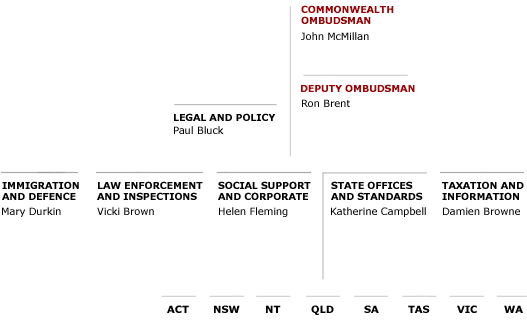Commonwealth Ombudsman Annual Report 2004-05 | Chapter 2


CHAPTER 2 | about us
History and establishment
The office of the Commonwealth Ombudsman was established by the Ombudsman Act 1976, and is administered by the Prime Minister. In 1971, the Commonwealth Administrative Review Committee issued a report recommending the establishment of a Commonwealth Ombudsman. The committee proposed a new and distinctive system of administrative law in Australia. It envisaged that the Ombudsman would play a part, along with courts and administrative tribunals, in examining government administrative action.
The office commenced operation on 1 July 1977. Since then, seven Commonwealth Ombudsmen have been in office. Over time the responsibilities of the Ombudsman have expanded to cover:
- complaints about the Australian Federal Police (AFP)—1981
- complaints about freedom of information—1982
- Defence Force Ombudsman role—1983
- responsibility for compliance auditing of AFP and National Crime Authority (now Australian Crime Commission) telecommunications intercept records—1988, with added responsibilities of monitoring controlled operations in 2001 and auditing of surveillance device records in 2004
- Australian Capital Territory Ombudsman—1989
- Special Tax Adviser function created—1995
- responsibility for auditing the use of compliance powers by members of the Building Industry Taskforce—2004
- responsibility for assessing and reporting on the detention of long-term (two years or more) immigration detainees—2005
- Postal Industry Ombudsman responsibilities to be added in 2005–06.
Role and functions
The office of the Commonwealth Ombudsman exists to safeguard the community in its dealings with government agencies. The office has three major statutory roles:
- Complaint investigation: the investigation and review of the administrative actions of Australian Government officials and agencies, upon receipt of complaints from members of the public, groups and organisations
- Own motion investigation: the investigation, on the initiative or 'own motion' of the Ombudsman, of the administrative actions of Australian Government agencies—often arising from insights gained from handling individual complaints
- Compliance auditing: inspection of the records of agencies such as the AFP, Australian Crime Commission and Building Industry Taskforce, to ensure compliance with legislative requirements applying to selected law enforcement and regulatory activities.
The complaint and own motion investigation roles of the Ombudsman are the more traditional ombudsman roles that constitute the bulk of the work of the office. The guiding principle in an Ombudsman investigation is whether the administrative action under investigation is unlawful, unreasonable, unjust, oppressive, improperly discriminatory, factually deficient, or otherwise wrong. At the conclusion of the investigation, the Ombudsman can recommend that corrective action be taken by an agency. This occurs either specifically in an individual case or generally by a change to relevant legislation, administrative policies or procedures.
A key objective of the Ombudsman is to foster good public administration within Australian Government agencies, ensuring that the principles and practices of public administration are sensitive, responsive and adaptive to the interests of members of the public.
The Ombudsman Act also confers two specialist roles on the Ombudsman:
- Defence Force Ombudsman—handling grievances lodged by serving and former members of the Australian Defence Force
- Taxation Ombudsman—handling complaints about the Australian Taxation Office.
The different roles and functions of the Ombudsman are depicted in feature pages in this annual report.
Australian Federal Police
Under the Complaints (Australian Federal Police) Act 1981, the Commonwealth Ombudsman and the AFP are jointly responsible for managing complaints about AFP members. These members may be employed in international, national and ACT community policing duties.
ACT Ombudsman
The Commonwealth Ombudsman also performs the role of ACT Ombudsman under the Ombudsman Act 1989 (ACT) in accordance with a memorandum of understanding between the Ombudsman and the ACT Government. The Ombudsman submits an annual report to the ACT Legislative Assembly on the performance of the ACT Ombudsman function.
Values
The key values of the Commonwealth Ombudsman are independence, impartiality, integrity, accessibility, professionalism and teamwork.
Organisation and structure
The national office of the Commonwealth Ombudsman and the office of the ACT Ombudsman are co-located in Canberra. The Commonwealth Ombudsman also has offices in Adelaide, Brisbane, Darwin, Hobart, Melbourne, Perth and Sydney.
The Ombudsman and Deputy Ombudsman are statutory officers appointed under the Ombudsman Act 1976. Staff are employed under the Public Service Act 1999. The office comprises a range of functional elements:
- Central office functions and responsibilities (including human resources, information technology, financial services, records management and public relations) and the principal specialist teams are based in the national office in Canberra.
- Offices throughout Australia handle complaints and undertake some specialist work. A Senior Assistant Ombudsman supervises the Adelaide, Brisbane, Darwin, Hobart, Melbourne, Perth and Sydney offices, as well as complaint handling relating to the ACT Ombudsman function.

Five Senior Assistant Ombudsmen manage the specialist teams located in the national office, one of whom also provides general oversight for our State offices. The specialist teams are:
- ACT Regional Team—dual role in complaint handling relating to Australian Government and ACT Government departments and agencies
- Defence Team—specialised advice and complaint handling relating to the Australian Defence Force, the Defence Housing Authority and the Department of Veterans' Affairs
- Immigration Team—specialised advice and complaint handling relating to the Department of Immigration and Multicultural and Indigenous Affairs
- Law Enforcement and Inspections Team—complaint handling, monitoring and investigation of law enforcement activities relating to Australian Government law enforcement agencies
- Social Support Team—specialised advice and complaint handling relating to the Department of Human Services (including Centrelink and the Child Support Agency) and relevant policy departments
- Taxation Team—specialised advice and complaint handling relating to the Australian Taxation Office, under the supervision of the Ombudsman's Special Tax Adviser.
Figure 2.1 illustrates the organisational structure of the Ombudsman's office.
FIGURE 2.1 Commonwealth Ombudsman organisational structure 2004-05

Outcome and output structure
Our 2004–05 Strategic Plan provides broad direction for our work, and the 2004–05 Portfolio Budget Statements define one central outcome for the office, supported by two outputs.
The central outcome is to achieve equitable outcomes for complaints from the public and foster improved and fair administration by Australian Government agencies. The supporting outputs are:
- the provision of a complaint management service for government
- the provision of advice to government to improve public administration.
Details of the Commonwealth Ombudsman's achievement against the outcome and outputs are in the 'Performance report' chapter of this report.
See the 'Accountability and management' chapter in this report for information about the office's Strategic Plan and business plans.
